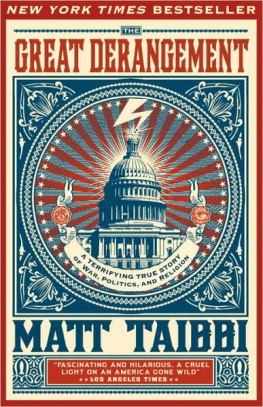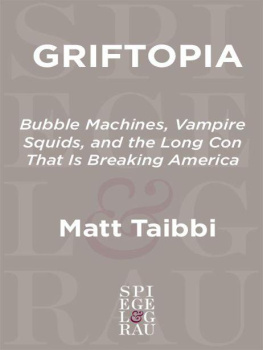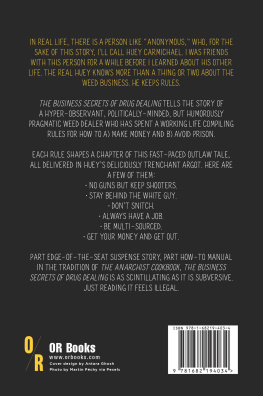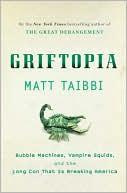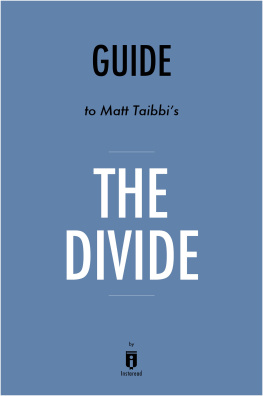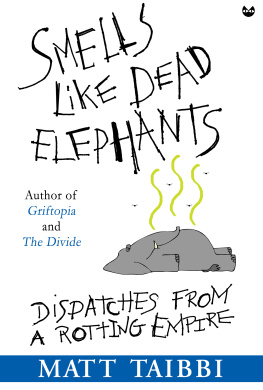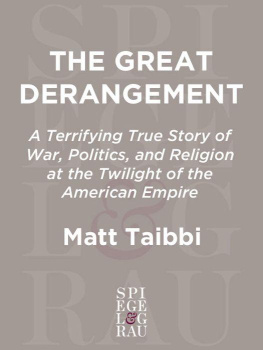Matt Taibbi - The Great Derangement
Here you can read online Matt Taibbi - The Great Derangement full text of the book (entire story) in english for free. Download pdf and epub, get meaning, cover and reviews about this ebook. year: 2008, publisher: Spiegel & Grau, genre: Art. Description of the work, (preface) as well as reviews are available. Best literature library LitArk.com created for fans of good reading and offers a wide selection of genres:
Romance novel
Science fiction
Adventure
Detective
Science
History
Home and family
Prose
Art
Politics
Computer
Non-fiction
Religion
Business
Children
Humor
Choose a favorite category and find really read worthwhile books. Enjoy immersion in the world of imagination, feel the emotions of the characters or learn something new for yourself, make an fascinating discovery.
- Book:The Great Derangement
- Author:
- Publisher:Spiegel & Grau
- Genre:
- Year:2008
- Rating:3 / 5
- Favourites:Add to favourites
- Your mark:
- 60
- 1
- 2
- 3
- 4
- 5
The Great Derangement: summary, description and annotation
We offer to read an annotation, description, summary or preface (depends on what the author of the book "The Great Derangement" wrote himself). If you haven't found the necessary information about the book — write in the comments, we will try to find it.
The Great Derangement — read online for free the complete book (whole text) full work
Below is the text of the book, divided by pages. System saving the place of the last page read, allows you to conveniently read the book "The Great Derangement" online for free, without having to search again every time where you left off. Put a bookmark, and you can go to the page where you finished reading at any time.
Font size:
Interval:
Bookmark:

CONTENTS

INTRODUCTION

T HIS BOOK came into being by means of a ridiculously long and tortuous series of editor-writer discussions, grotesque literary failures, nervous collapses, abrupt about-faces, cop-outs, lies, and other types of grossly unprofessional behavior. And whats most funny about it is that it ended more or less where it startedas a long examination of where the American publics head is in advance of the 2008 elections, forged in a crucible of flailing, masturbatory nihilism.
I was originally contacted shortly after the release of my last book, Spanking the Donkey, not by Spiegel and Grau (which didnt exist at the time), but by Crown, another Random House imprint, in the person of editor Chris Jackson. If I remember correctly, what he wanted was some sort of taxonomic survey of the worst people in American politics and culturea rogues gallery, put together in handy reference form, which would be full of various insults and vituperation. At the time I was a little depressed about the number of requests I was getting from editors to whale on people in print and was somewhat afraid that I was going to be buttonholed, professionally, into a role as a kind of lefty/alternative hatchet mana liberal Ann Coulter. It didnt help that I was secretly afraid that this very thing was my only salable skill in the American media market.
So I wormed my way out of that idea and somehow sold the good people at Crown on a new, more serious subject, one more befitting my status as a serious political commentator. This would be an essay of monstrous import about the fake left/right, blue-state/red-state conflict that, Id hoped to argue, was a fraud being consciously perpetrated on the public by a cultural conspiracy with the outrageously pretentious name The Thinkophancy. I made it about eleven thousand words into that effort before realizing that even I had no idea what the fuck I was talking about. I vividly remember my last read-through of that text; I literally squirmed in shame. I knew that if I were to finish such a book and actually see it published, Id be covering Inuit volleyball in Alaska before the release of the 2007 spring list.
So I junked that idea and did yet another about-face, this time selling Chris on a year-long diary of Congress in action. By then Id done a long piece about Congress for Rolling Stone and had been somewhat shocked to see how our government really operates. Having lived outside of the United States for most of my adult life, I was really a neophyte when it came to understanding the mechanics of American power. But after spending a great deal of time on the Hill, I began to develop a theory about American politics as a kind of closed loop of inside players, an oligarchy of commercial interests who ran Washington in conjunction with their hired hands in Congress as a closed shop.
The lawmaking process had evolved over time in such a way that almost all of the important decisions could be made behind closed doors by a few key players in both houses, without debate or discussion and certainly without any real input from the voting public. I was amazed to see that Congress spent most of its daylight hours naming post offices and passing resolutions to honor sports teams, while the important stuff it didlike gut the Clean Air Act as an emergency response to Hurricane Katrinait did in late-night meetings of mostly anonymous committees, out of the (at least potentially) prying eye of the press and the public.
A key point I took home from my examination of Congress was that both parties, Democratic and Republican, were equally guilty in what really was a conspiracy to run the government without outside interference. The only way the public could protest all the handouts and earmarks and fast-tracked tax breaks and other monstrosities was to vote for the other partyand the other party, it turned out, was inevitably whoring for the same monied masters.
Excepting a few rogue, quixotic members who eschewed the usual campaign donors, Congress was mostly a highly advanced, finely tuned mechanism for turning favors into campaign donations and vice versa. It was a system of formalized political tribute not at all unlike that of the old Supreme Soviet, where the daylight hours were occupied with political debates about how the USSR could best aid socialist friends in Mozambique or confront American racism in the South, while behind closed doors fat bloated party functionaries conducted the real business of divvying up military contracts and highway concessions.
I was all set to spend a full year covering this business, in particular following the appropriations season, but my day job at Rolling Stone unfortunately forced me to travel away from Washington far too much to do that work effectively. I remember trying to fake my way through the project by following a C-SPAN Webcast of an appropriations hearing from a hotel in Islamabad, where Id been sent to cover an earthquake. Even so I was managing to keep up, but then a few days later in Kashmir I ate some kind of fruit and nut salad my fixer had prepared for the Eid holiday and contracted a horrible bacterial illness. I was on the way home on an El Al flight, writing a section about Congressman Joe Barton, when I suddenly spiked a fever of about 105 and fell over face-first into my keyboard. Convalescing a few weeks later, a doctors note in hand, I broke the bad news to Chris that I might have to bail on this project as well. I started to hoard my money in an expectation of giving back my advance.
But then a funny thing happened: while on the road for my magazine in the subsequent months, traveling all across America, I began to notice what I quickly realized was a phenomenon directly related to the mess in Washington. There was a consequence, a flip side to the oligarchical rigged game of Washington politics: apparently recognizing that theyd been abandoned by their putative champions in Washington, the public was now, rightly it seemed, tuning out of the political mainstream.
But they werent tuning out in order to protest their powerlessness more effectively; they were tuning in to competing versions of purely escapist lunacy. On both the left and the right, huge chunks of the population were effecting nearly identical retreats into conspiratorial weirdness and Internet-fueled mysticism.
As the national affairs correspondent for Rolling Stone I had been given a general mandate to seek out and describe the nature of George Bushs America in the post-9/11 era, and as the years went by I began to see the outlines of the grotesque black comedy that had taken root in this country since that singular day six years ago. It all came together for me one day when I tried to imagine the whole thing from the point of view of Osama bin Laden. Here he had gone through all the trouble of attacking New York City, and how did the victim nation respond?
Well, its government responded by counterattacking the wrong country and passing a whole host of insane laws that had nothing whatsoever to do with terrorism; its president responded by encouraging its citizens to buy Chevys and go on vacations. Then, when it came time to ask why the attack had happened, the president announced that it had happened because the terrorists, well, those folks hated our freedom. Examining this rationale, the mainstream press did not denounce Bushs reasoning as the preposterous horseshit it was, but instead tripped over themselves en masse in a desperate attempt to find new ways to compare their leader to Winston Churchill. Months later, bin Laden himself had been forgotten, and the country moved on to denouncing the real enemy, culminating in the banning of French fries from the congressional cafeteria.
Next pageFont size:
Interval:
Bookmark:
Similar books «The Great Derangement»
Look at similar books to The Great Derangement. We have selected literature similar in name and meaning in the hope of providing readers with more options to find new, interesting, not yet read works.
Discussion, reviews of the book The Great Derangement and just readers' own opinions. Leave your comments, write what you think about the work, its meaning or the main characters. Specify what exactly you liked and what you didn't like, and why you think so.

